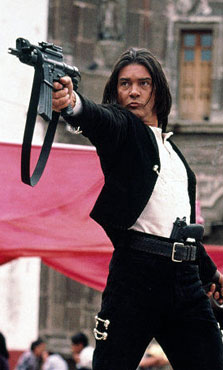 Seeing this film the same weekend as “Lost In Translation”, I was struck by the distinct kinds of pleasure each movie has to offer. Sofia Coppola’s sophomore effort is thoughtful, laconic, and rich with poetic insight, while Robert Rodriguez’ sprawling epic is loud, violent, and plotted with shameless pulpiness. Both are highly artistic, and both have completely different kinds of spine-tingling charm. Seeing this film the same weekend as “Lost In Translation”, I was struck by the distinct kinds of pleasure each movie has to offer. Sofia Coppola’s sophomore effort is thoughtful, laconic, and rich with poetic insight, while Robert Rodriguez’ sprawling epic is loud, violent, and plotted with shameless pulpiness. Both are highly artistic, and both have completely different kinds of spine-tingling charm.
“Once Upon A Time In Mexico” rides high on the sheer thrill of moviemaking. Most know going in that Rodriguez is one of the most enjoyable guerilla filmmakers in the business. After the trio of “Spy Kids” moneyspinners, it’s a relief to have him back in his old hauntspop romance and Spaghetti Western excesses set in dusty Mexican villages. Like some of his peers, namely Quentin Tarantino and Wes Anderson, Rodriguez has obviously been raised on movies and has arrived at artistic maturity without a jaded eye. Action movies are often described as “fun”, usually with frightful misapplication, but with Rodriguez’ films the term fits perfectly. Normally the mindless shock of a harmless old man gunned down in an act of gratuitous homicide would be nausea, if not outright disgust. But when this happens in “Once Upon A Time In Mexico”, the fun of the scene comes from the fact that (like most of the myriad shooting victims in the film) the old man has been rigged to a wire, and the buckshot blast carries him halfway across the screen and off camera. Violent? Only a churl would deny such moments the head-shaking giddiness they inspire. These are boys playing with pop-guns in the backyard.
Antonio Banderas, back as El Mariachi, doesn’t have a whole lot to do here but stare volcanically at the world from beneath the deep ridge of his forehead. Though the obsequious uppercut of Rodriguez’ camera makes an epic warrior of him, the funnniest bits involve his flashbacks when, with Pavlovian regularity, he pulls out the trusty guitar and steps into a music video bordering on Tesh-like sappiness. Salma Hayek’s knife-throwing vixen is a welcome addition to the Mariachi backstory. The scene in which they awaken chained together in an assassination attempt typifies the mercurial comedy of the action set-ups. Although “set-up” is a misnomer for this kind of ad-libbed plotting, the saving difference is that Rodriguez always finds a way to pay off the liberties he takes. With the chain, the coup de grace comes later, when they have it severed— at their wedding ceremony.
Full of such recurring details, ‘Once Upon A Time’ is the work of an artist working in pulp, not a hack stealing from his betters. The movie has a distinctive B feeling to it, but as a point of style rather than a limitation. Rodriguez follows through on all his jokes and visual wizardry until it rushes together in an apocalyptic whirlwind that embodies all the rousing joys of moving pictures. With its whistling bullets, exploding kneecaps, and bombs strapped to remote control guitars, this film will never achieve polite respectability (nor ask for it). But call his style an A minus anyway.
Rodriguez has a big assist to go along with his breakneck visual stylings: for the second time this summer, Johnny Depp simply grabs and pockets a movie. His sniggering C.I.A. operative is one of the best movie villains in recent memory, although the running joke of a plot obscures his real intentions to the point where you’re not sure if he really is a villain or not. The confusion he creates is hilarious and also surprisingly relevant to current affairs in the world. I was reminded of Woody Allen’s “Bananas”, in which a plane load of soldiers drops into San Marcos during a coup. Before they make the jump, they realize they’re going to be fighting each other: “The C.I.A.’s not taking any chances this time.” As the representative of American imperialism and sheer white arrogance, Depp’s agent foments betrayal on every side until you begin to wonder if he won’t somehow slit his own throat. His languid duplicity would be compelling enough.
Again, though, Rodriguez’ witty script continuously adds layers. The prosthesis that gets a chuckle early on gets a bigger one later, while the coldness toward a one-eyed Cheech Marin backbites him later with wicked irony. True, what little there is of story is flimsy, but Rodriguez never lets his characters down. Depp rewards him with one of his most memorable performances. The finale of “Once Upon A Time In Mexico” is an exultant and exceedingly strange paean to grassroots democracy. As soon as a throng of Mexicans marching in the Day of the Dead parade instantly appear with heavy machine guns to fight off the coup d’etat—the People refusing to be bullied by the local warlord—it’s apparent that a semi-serious political statement is to be made (“semi” because, for example, Rodriguez has one of his patriots attaching an M-60 to the top of a hot dog cart).
But what is it, exactly? El Mariachi echoes the Washington war-mongers’ worrying truism, oft-repeated after September 11, that freedom isn’t simple and must be zealously guarded. But Rodriguez’ subtext reveals anything but a pro-American position. El Mariachi supports the established political regime against the revolutionaries, but, importantly, he does this in direct opposition to the meddling American imp. No doubt deliberately, the film’s statement is deliciously ambiguous, and like almost everything else that pinwheels out of Rodriguez’ feverish imagination, it reveals a throwaway thoughtfulness that ‘serious’ films would kill for. |